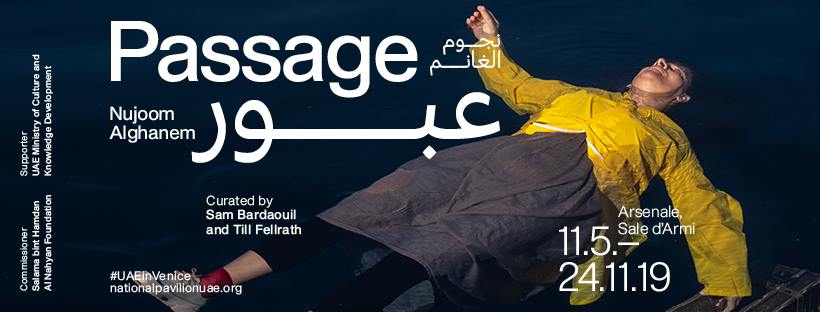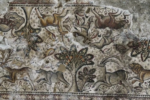58. Biennale – Padiglione Emirati Arabi Uniti

Nujoom Alghanem rappresenta gli Emirati Arabi Uniti alla Biennale di Venezia col progetto Passage.
Comunicato stampa
Nujoom Alghanem
Passage
United Arab Emirates Pavilion at the Venice Biennale
May 11–November 24, 2019
Inauguration : May 8, 12:30–1:30pm
United Arab Emirates Pavilion at the Venice Biennale
Arsenale
Venice
Italy
nationalpavilionuae.org
Facebook / Instagram / Twitter
The United Arab Emirates Pavilion at the 58th Venice Biennale opens to the public this week with Passage, an immersive, 26-minute, two-channel video and 12-channel sound installation by poet, filmmaker and artist Nujoom Alghanem. Filmed in the UAE and in Venice, the site-specific work has been conceived and developed in close collaboration with the Pavilion curators Sam Bardaouil and Till Fellrath.
Passage expands Nujoom Alghanem’s experimentation with contemporary Arabic poetry through the language of film. Taking her quintessential 2009 poem, The Passerby Collects the Moonlight, as a point of departure, this installation provides a poignant reflection on the universal experience of displacement.
Passage is structured along two distinct narratives, one “real,” the other “fictional,” which are simultaneously projected as two non-linear films on the opposite sides of the same screen. The “real” narrative depicts the endeavours of Nujoom and Amal, a Syrian actress residing in the United Arab Emirates, to create a film for the Pavilion. The “fictional” narrative is an aestheticised portrayal of Falak, a displaced woman on an arduous journey. The latter is conceived by Nujoom and played by Amal. This Brechtian conflation of reality and fiction, culminating in a scene that depicts Falak arriving to the Pavilion in Venice, prompts the viewer to consider the parallels between the film’s three main protagonists: the director, the actress and the fictional character. These three women of a similar age are connected by the experience of shared dualities: the hidden and the revealed, fragility and power, as well as belonging and displacement.
The experience of passage and duality also permeates the design of the exhibition space, where visitors can enter and exit from either side of the Pavilion. A large 3 x 6 meter screen, diagonally positioned at the center, divides the space into two symmetrical halves. The viewers are invited to engage both with Nujoom and Amal's real process of creating the film, as well as with the cinematographic portrayal of the fictional character of Falak. At several moments throughout the film, Nujoom’s voice is heard reciting segments from her poetry. The two films are bound by one shared soundtrack, which evokes a different meaning on each side of the screen. Only after visitors have crossed over to the other end they realize that the two ostensibly separate films are in fact two sides to the same story. The viewers and the film’s protagonists alike will have each undergone a “passage” of their own.
Curators Sam Bardaouil and Till Fellrath say: “In Passage, Alghanem weaves together two genres of storytelling: the ancient art of poetry, which continues to be a living art form deeply steeped within the local cultural landscape, with filmmaking, which is relatively recent within the context of the UAE. The installation explores the psychological, emotional and physical experience of displacement, a theme that underpins much of Alghanem’s practice. Through the accentuation of reality and fiction, she further implicates the viewers in one of the film’s central questions; the extent to which art is able to meaningfully impact the lives of those whose stories it seeks to tell.”
In discussing her film, artist Nujoom Alghanem says: “Through Passage, I seek to intertwine the parallels between my personal experience and the films’ two main protagonists, the actress Amal, and Falak the fictional character she portrays. The film employs the complex realities lived by many women as a vehicle to reflect, in a metaphorical manner, on some of the most pressing challenges of our time.”
Angela Migally, Executive Director of the Salama bint Hamdan Al Nahyan Foundation, commissioner of the National Pavilion UAE, says: “Nujoom’s poetry and filmmaking are renowned for their compelling narratives, and her commissioned work for the National Pavilion UAE is a powerful example. The Salama bint Hamdan Al Nahyan Foundation tells the untold stories of the UAE through cultural projects. This important and intriguing new work explores connected yet distinct stories that are both universally relevant, and deeply rooted in the region.”
The exhibition is accompanied by a fully illustrated 136-page publication under the same title, edited by Sam Bardaouil and Till Fellrath. The publication is available in two separate English and Arabic language editions and includes an essay by the curators, an interview with the artist, several poems by Alghanem, and a selection of imagery from the film. It is jointly published by the National Pavilion UAE, Abu Dhabi, and Silvana Editoriale, Milano.
ISBN [English]: 9788836643486 / ISBN [Arabic]: 9788836643493.
The United Arab Emirates Pavilion at the Venice Biennale is commissioned by the Salama bint Hamdan Al Nahyan Foundation and supported by the UAE Ministry of Culture and Knowledge Development. The UAE has participated in the Venice Biennale since 2009 and maintains a permanent pavilion in the Arsenale – Sale d’Armi. 2019 marks the UAE’s sixth participation at the Venice Biennale.



